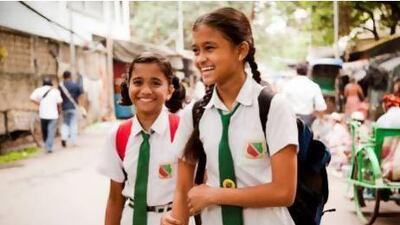Sokha, a Cambodian teenager, was an orphan who scavenged through Phnom Penh's smoky rubbish dumps, "where a girl is one more thing the world has thrown away". A stroke of luck enabled her to study, a rarity for a poor girl in her country. Now Sokha is a trained dancer. She has a future that, given her circumstances, she never could have imagined.
Sohka is one of nine girls in nine stories in Girl Rising, a film that breaks a lot of documentary rules. Like her story, scripted by the Cambodian writer Loung Ung and spoken by Alicia Keys, each girl's testimony comes from a place with its own cinematic palette. Each weaponises learning in a society that restricts it.
Moral tales about overcoming injustice are staples of the US documentary scene. Most of those films struggle to find an audience.
Girl Rising, released to mark this year's International Women's Day on Friday, eyes a broad public for its journey through a crucial cause of global poverty - and a reversible one, economists say. The film's ambitions look past its urgent subject and nine lives in progress.
"You have to think of it as a messaging campaign that goes far beyond the confines of a documentary," says the producer Holly Gordon, formerly of ABC News, who began targeting the audience for Girl Rising before the film was made. She posed two questions: "How were we going to make something that people wanted to watch, and how were we going to raise money and prove impact?"
Gordon enlisted high-income allies - Paul Allen, Microsoft's co-founder, is an executive producer, while Intel is a funder. The actress Freida Pinto and the novelist Edwidge Danticat, one of the writers, previewed excerpts at the Sundance Film Festival in January. Pinto Twittered the message: "If you educate girls, you will change the world."
The idea for Girl Rising came from its director, Richard E Robbins, who based his 2007 Oscar-nominated documentary, Operation Homecoming, on letters sent home from US soldiers in Iraq.
Compelling but grim, that much-praised documentary died in the marketplace. Robbins, an ABC News veteran and a TV writer on Scandal, never connected with the huge US military audience. "I was always convinced that there would be demand in military communities, but military communities didn't have art-house cinemas showing independent films," he says.
Girl Rising faced similar hurdles, Robbins notes. The vast subject seemed an inevitable tragedy. "You see how bad things are on a broad systemic level, and you can easily get overwhelmed and discouraged," he says. "Too often, I think, heart-in-the-right-place documentarians get lost in describing how bad things are."
Robbins made that mistake. He began a film on the global calamity of girls denied education and gave up. "If you focus on all the horrible things that happen to girls when they don't go to school, you'll want to crawl into a hole and never come out. If you focus on the things that happen to girls when they do go to school, and on the girls themselves engaged in that struggle, that's incredibly exciting."
The script for Girl Rising grafts those strands of hope onto the narrative approach of Operation Homecoming, in which actors spoke the words of soldiers' letters. In Girl Rising, Danticat scripted testimony from Wadley, a Haitian girl in post-earthquake Port-au-Prince, and Manjushree Thapa wrote in the voice of Suma, in Nepal, who learnt to read from a teacher living in the home where she was a bonded labourer. Those parts are read, respectively, by Cate Blanchett and Kerry Washington.
Robbins confesses to documentary heresy in taking the side of the girls and in re-enacting events. Balance and neutrality are jettisoned. So are talking heads and cinema verite's disdain for voice-over narrative. And the film looks like cinema rather than TV news. "I found that traditional documentary techniques, when used in the developing world, tended to focus on the things that I thought were the least important about the stories that we were trying to tell," he says.
"Essentially, what you have are real girls playing themselves in their real surroundings in scripted stories based on events from their own lives," he explains.
Taking those stories to an American public depends largely on supporters organising screenings and filling cinemas, like a US political campaign, says Gordon. Girl Rising opens Thursday in conventional cinemas in New York and Los Angeles. In other cities, the film will be part of selected screenings through the Theatrical on Demand model.
The assumption is that there's no substitute for putting the public in a room. "Movements don't happen when you're alone," Gordon stresses. "Movements happen when you're sitting alongside other people who share your belief and your passion for an issue or an idea."
So far, Gordon has raised about US$3 million (Dh11m) for the film, which any independent filmmaker would envy, and much more for her philanthropic programme. "It's a lot of money for a film like this," she says. "It's not a lot of money if you really want to change the world. It's nothing - it's a hundredth of a corporate ad campaign."
In the edit room, Robbins was already anticipating the critics.
"For the cost of making this film, we could have built a lot of schools," he admits. "We wouldn't have done this if we didn't believe that the investment in the film would lead to many many more schools than it would if we had bypassed the film and taken the money straight into the field."
Girl Rising opens in New York and Los Angeles Thursday, ahead of International Women's Day Friday, followed by selected screenings. For more information go to www.girlrising.com

